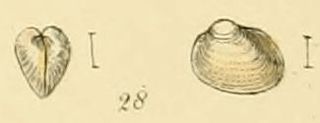 W
WBotula fusca, or the cinnamon mussel, is a species of bivalve mollusc in the family Mytilidae. It can be found along the Atlantic coast of North America, ranging from North Carolina to the West Indies and Bermuda.
 W
WChama macerophylla, or the leafy jewel box clam, is a species of bivalve mollusc in the family Chamidae. It can be found along the Atlantic coast of North America, ranging from North Carolina to the West Indies.
 W
WCrenatula picta is a species of marine bivalves in the family Pteriidae. It is known from Madagascar and the Red Sea.
 W
WCyclina sinensis, commonly known as Chinese venus, black clam, iron clam, and Korean cyclina clam, is a clam species in the venus clam family, Veneridae. It mostly lives in the flats on the coast of seas in East Asia, such as the Yellow Sea and the West sea.
 W
WThe eastern oyster —also called Wellfleet oyster, in Wellfleet Mass., Atlantic oyster, Virginia oyster in Virginia, or American oyster. May also be called North Amerian East Coast Oyster or East Coast Oyster. Other notable Eastern appellations - Malpeque PEI, BluePoint. Chesapeake Bay Oyster, Apalachicola FLA, amongst others C. virginica —is a species of true oyster native to the eastern seaboard and Gulf of Mexico coast of North America. C. virginica ranges from Northern New Brunswick, is grown in all Maritime provinces of Canada Is grown in all eastern seaboard States, the States of The Gulf of Mexico, is found in parts of the West Indies, and into Brazil. It is also farmed in Puget Sound, Washington, where it is known as the Totten Inlet Virginica. and found in Pearl Harbour, Hawaii. Eastern oysters are and have been very popular commercially. Today, less than 1% of the population when the first 17th-century colonists arrived is thought to remain in the Chesapeake Bay and its tributaries.
 W
WFabulina fabula, the bean-like tellin, is a species of marine bivalve mollusc in the family Tellinidae. It is found off the coasts of northwest Europe, where it lives buried in sandy sediments.
 W
WIsognomon alatus, the flat tree oyster, is a species of bivalve mollusc in the family Isognomonidae. It can be found along the Atlantic coast of North America, ranging from southern Florida to Brazil and Bermuda.
 W
WLaevicardium crassum, the Norwegian egg cockle, is a species of saltwater clam, a cockle, a marine bivalve mollusc in the family Cardiidae, the cockles.
 W
WLimaria fragilis, the fragile file clam, is a species of bivalve mollusc in the family Limidae. It is found in shallow waters in the Indian and Pacific Oceans and has the ability to swim.
 W
WLimaria hians, the flame shell, is a species of small saltwater clam, a marine bivalve mollusc in the family Limidae. This species is native to the northeastern Atlantic Ocean.
 W
WLutraria oblonga, common name the oblong otter shell, is a species of large saltwater clam, a marine bivalve mollusc in the family Mactridae.
 W
WMytilaster lineatus is a species of marine mussel, distributed in European waters. It is common in Greece, Russia and Ukraine. It is referred as an introduced species in the Caspian Sea.
 W
WParatapes textilis is a species of saltwater clam, a marine bivalve mollusk in the family Veneridae, the Venus clams.
 W
WPerna canaliculus, the New Zealand green-lipped mussel, also known as the New Zealand mussel, the greenshell mussel, kuku, and kutai, is a bivalve mollusc in the family Mytilidae. P. canaliculus has economic importance as a cultivated species in New Zealand.
 W
WPinna carnea, commonly called the amber pen shell, is a species of bivalve mollusc in the family Pinnidae.
 W
WPisidium casertanum, the pea cockle or pea clam, is a minute freshwater bivalve mollusc of the family Sphaeriidae.
 W
WPlacopecten magellanicus, previously listed as Pecten tenuicostatus and as Pecten grandis and once referred to as the "giant scallop", common names Atlantic deep-sea scallop, deep sea scallop, North Atlantic sea scallop, American sea scallop, Atlantic sea scallop, or sea scallop, is a commercially important pectinid bivalve mollusk native to the northwest Atlantic Ocean.
 W
WVenerupis corrugata, the pullet carpet shell, is a species of bivalve mollusc in the family Veneridae. It is found buried in the sediment on the sea bed in shallow parts of the eastern Atlantic Ocean. It is harvested for human consumption in Spain and other parts of Western Europe.
 W
WVenus nux is a species of saltwater clam. They are marine bivalve molluscs in the family Veneridae, sometimes known as the venus clams.